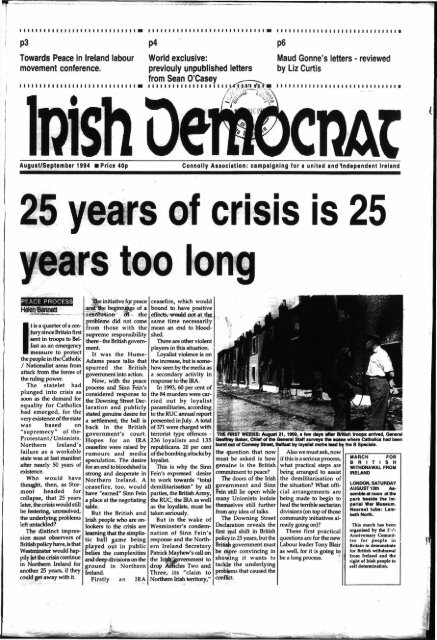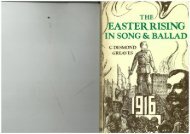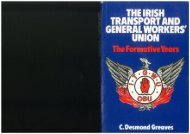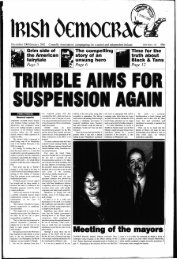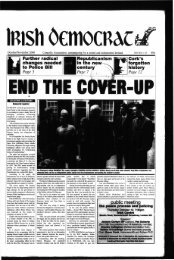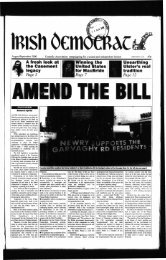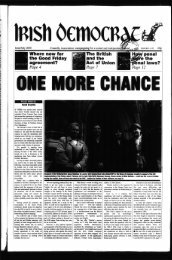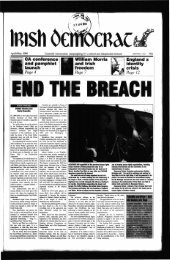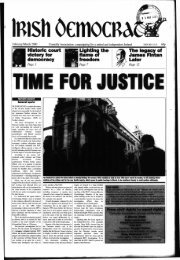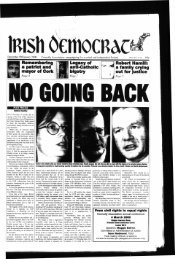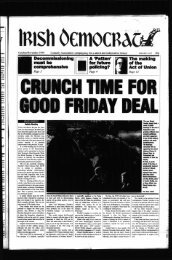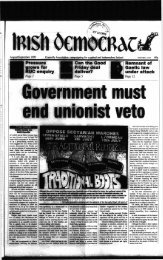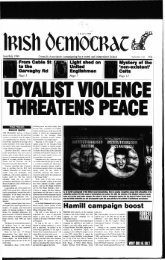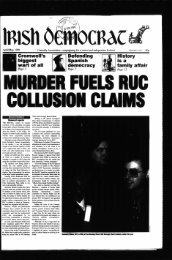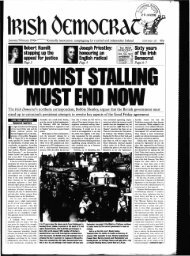Create successful ePaper yourself
Turn your PDF publications into a flip-book with our unique Google optimized e-Paper software.
I I I I I I I I I I I I I I I I I I I I I I I I I I I I I • I I II I I I I I I I I I I I I I I I I I I I I I I I I I • I I I I I I I I I I I I I I I I I I I I I I I I I I I I II I<br />
p3 p4 p6<br />
Towards Peace in Ireland labour World exclusive: Maud Gonne's letters - reviewed<br />
movement conference. previouly unpublished letters by Liz Curtis<br />
from Sean O'Casey ^—^<br />
<strong>August</strong>/<strong>September</strong> <strong>1994</strong> • Price 40p Connolly Association: campaigning for a united and Independent Ireland<br />
is 25<br />
It is a quarter of a century<br />
since Britain first<br />
sent in troops to Belfast<br />
as an emergency<br />
measure to protect<br />
the people in the Catholic<br />
/ Nationalist areas from<br />
attack from the forces of<br />
the ruling power.<br />
The statelet had<br />
plunged into crisis as<br />
soon as the demand for<br />
equality for Catholics<br />
had emerged, for the<br />
very existence of the state<br />
was based on<br />
"supremecy" of the-<br />
Protestant/Unionists.<br />
Northern Ireland's<br />
failure as a workable<br />
state was at last manifest<br />
after nearly 50 years of<br />
existence.<br />
Who would have<br />
thought, then, as Stormont<br />
headed for<br />
collapse, that 25 years<br />
later, the crisis would still<br />
be festering, unresolved,<br />
the underlying problems<br />
left untackled?<br />
The distinct impression<br />
most observers of<br />
British policy have, is that<br />
Westminster would happily<br />
1/et the crisis continue<br />
in Northern Ireland for<br />
another 25 years, if they<br />
could get away with it.<br />
The initiative f
HEADLINES<br />
HEADLINES<br />
C O M M E N T<br />
What about<br />
the Ulster<br />
Protestants?<br />
Sean O' Casey on page 4 of this issue<br />
writes of the IRA border campaign in<br />
the 50s: "It is a rotten policy, and keeps<br />
the Ulster Protestant hard-hearted, and<br />
sends him deeper into his den."<br />
His words 36 years later have a horrible ring<br />
of truth. The Ulster Protestants, ( very many of<br />
them) have become harder and more ruthless<br />
after 22 years of direct rule from Britain, (no<br />
democracy) and 25 years of Republican/British<br />
warfare. The British all the while have used<br />
them to avoid any real attempt at solving the<br />
problem. And the Tories have continued to cynically<br />
use the Loyalist MPs to bolster up their<br />
own position.<br />
Now, with the Downing Street Declaration,<br />
the mat is beginning to be pulled from under<br />
the Loyalist feet. This is already too much for<br />
some. Although the unionist majority still has a<br />
veto on any progress, a politically united<br />
Ireland is now on the cards.<br />
Conservative MP Nicholas Budgen, writing<br />
in the Guardian (July 28), is on to the "disastrous<br />
drift in policy on Northern Ireland," but<br />
argues that the British should: "just say that we<br />
want the union to survive and that we shall<br />
govern Ulster in a manner designed to achieve<br />
that end." Which means no more discussions<br />
with the Dublin government or Sinn Fein, no<br />
more peace process. If s a logical position: either<br />
you go forward, or go back. But Mr Budgen is<br />
using the rise of Loyalist violence as the stick to<br />
argue a backwards direction.<br />
The alternative position is to go forward and<br />
make the demilitarisation of the situation an urgent<br />
priority.<br />
Not all Unionists want to go back to the old<br />
regime; some are trying to visualise some new,<br />
tolerant Northern Ireland. Ulster Unionist Party<br />
councillor in West Belfast, Chris McGimpsey,<br />
speaking at the Towards Peace in Ireland conference<br />
in London said: "What we want is a continuance<br />
of a thoroughgoing programme of<br />
reform upon which we can build a truly liberal<br />
and pluralistic society." He should be encouraged<br />
to get that message through on the<br />
Shankill.<br />
Sinn Fein president Gerry Adams has appealed<br />
to Unionist leaders to prepare their<br />
people for change. Chris McGimpsey said the<br />
UK was better place to live than the Republic of<br />
Ireland because of its cultural diversity.<br />
But Ireland is already a culturally diverse<br />
country. So why shouldn't we fight to make it<br />
more so, and break down intolerance in the<br />
south, for example, in some circles, of the Northern<br />
nationalists?<br />
Let the last word go to Sean O' Casey, writing<br />
in the same letter quoted above:<br />
"Long ago I suggested that the <strong>Irish</strong> government<br />
should invite the Orangemen to hold a<br />
Twelfth Parade in Dublin to show that the Orangeman<br />
was reckoned as <strong>Irish</strong> as anyone else."<br />
HB<br />
lnishOemocM<br />
NEWSPAPER OF THE CONNOLLY ASSOCIATION<br />
Founded 1939 Vol 49, no 6<br />
EDITORIAL BOARD: Helen Bennett (editor), Gerard<br />
Curran, Conor Foley, Jonathan Hardy, Martin Moriarty,<br />
Peter Mulligan<br />
TYPESET AND DESIGNED: Connolly Publications<br />
PUBLISHED BY: Connolly Publications Ltd, 244-246<br />
Gray's Inn Road, London WC1X 8JR Tel: 071-633 3022<br />
PRINTED BY: Ripley Printer* (TU) Ltd, Nottingham<br />
Road, Ripley, Derbyshire. Tel: 6773-731641<br />
1939-1980 and 1981-90 now available or^microfilm<br />
Breaking down barriers<br />
ACTIVITY<br />
London reporter<br />
The Labour movement<br />
conference Towards<br />
Peace in Ireland in July<br />
was remarkable for bringing<br />
together speakers from all<br />
sides: SDLP leader John<br />
Hume, Labour spokesperson<br />
on Northern Ireland, Kevin<br />
McNamara, Sinn Fein councillor<br />
in Derry and Six Counties<br />
chairman, Mitchel Mc-<br />
Laughlin and Ulster Unionist<br />
Party councillor in West Belfast,<br />
Chris McGimpsey.<br />
John Hume spoke about<br />
breaking down barriers.<br />
"As the walls fall all over<br />
Europe, it has been necessry to<br />
build 13 walls in the city of<br />
Belfast to separate and protect<br />
one section of the people from<br />
another. And those walls are<br />
an indictment of everybody involved<br />
in what has become the<br />
<strong>Irish</strong> problem.<br />
"The challenge is: are we all<br />
prepared to re-examine in<br />
depth out past attitudes with<br />
the dream of bringing down<br />
those walls."<br />
He compared the Unionist<br />
mind-set to the Afrikaner<br />
mind-set, "which says that the<br />
only way to protect themselves<br />
is to hold all the power in<br />
their own hands and exclude<br />
everyone who's not one of<br />
them...<br />
"What is required of the<br />
unionist people today is that<br />
they might take some example<br />
from the white South Africans<br />
and have the confidence to<br />
stand on their own feet.."<br />
And small conciliatory<br />
noises could be heard.<br />
Unionist Chris McGimpsey<br />
did admit that "the demand<br />
for civil rights was a wholly<br />
legitimate reaction to an administration<br />
which had become<br />
out of touch." But he did<br />
go on to say that "the peaceful<br />
aims of reform were usurped<br />
by those wielding a gun."<br />
Mitchel McLoughlin paid<br />
British Prime Minister John<br />
Major a compliment, saying: "I<br />
do recognise that John Major,<br />
despite his very pressing<br />
political problems, has<br />
devoted an unprecedented<br />
amount of his energy and attention<br />
to the challenge of ending<br />
the conflict in Ireland.<br />
"I also feel it is correct to<br />
acknowledge that under his<br />
premiership the British<br />
government position has<br />
shifted."<br />
Other speakers included<br />
Clive Soley MP, former Northern<br />
Ireland spokesperson,<br />
Northern Ireland Select Committee,<br />
Dr Brendan O'Leary of<br />
From Civil Rights to Human Rights<br />
DISCUSSION<br />
Jonathan Hardy<br />
Addressing the conflict<br />
in Ireland through the<br />
language of human<br />
rights has increased considerably<br />
in the last few years.<br />
There are now several organisations<br />
including the<br />
Britain and Ireland Human<br />
Rights Project and Britain<br />
and Ireland Rights Watch,<br />
set up specifically to<br />
moniter and challenge<br />
abuses. At the Towards<br />
Peace in Ireland conference,<br />
the value of a human rights<br />
approach was discussed by<br />
Michael Fairell of the <strong>Irish</strong><br />
Council for Civil Liberties<br />
adn John Wadham, legal<br />
director of Liberty.<br />
Sixth Desmond Greaves<br />
Weekend Summer School<br />
<strong>Irish</strong> Labour History Museum, Beggars Bush, Dublin<br />
Friday <strong>August</strong> 26<br />
Dr Luke Gibbons • Refiguring National Identity:<br />
How culture becomes politics in Ireland<br />
Chair: Professor Brendan Bradshaw, Cambridge<br />
University<br />
Saturday <strong>August</strong> 27<br />
Kieran Crilly - Raymond Crotty, economist and<br />
economic historian: an assessment<br />
Chair: Anthony Coughlan, Trinity College Dublin<br />
Sunday <strong>August</strong> 28<br />
Dr Alt O'Brien - Nascent Capitalism, English<br />
Colonialism and the Conquest of Ireland<br />
Chair: Mary Cullen, Maynooth College<br />
Jack Bennett - Northern Ireland: two communities,<br />
identities, religions, nations or what?<br />
Catriona Ruane - Northern Ireland: perspectives of<br />
a human rightsand Third World activist<br />
Chair: Noirin Green, SIPTU<br />
£12 full school, £3 individual sessions. Social and<br />
garden party included, Bookings to •<br />
Cathal MacUam, Summer School Director<br />
24 Belgrave Rd,<br />
Dublin 6 (tel: 4973154)<br />
IRISH DEMOCRAT A u g u s t / S e p t e m b e r 1 9 94 page 2<br />
Michael Farrell spoke of<br />
the climate of opinion<br />
which percolated out of the<br />
conflict in the North in the<br />
70s and 80s, within which<br />
simply to raise civil liberties<br />
issues risked one being<br />
branded as a "provo sympathiser"<br />
or "fellow<br />
traveller." During this<br />
period the <strong>Irish</strong> government<br />
introduced a series of<br />
repressive measures including,<br />
most famously, the<br />
Section 31 media ban. Opposition<br />
became emasculated<br />
and the record of the<br />
<strong>Irish</strong> Labour party in challenging<br />
attacks on civil<br />
liberties was, he argued,<br />
"appalling."<br />
However, the situation<br />
is now changing. Greater<br />
use has been made of International<br />
Human Rights<br />
standards as a means of<br />
challenging abuses by the<br />
state and its emanations.<br />
There has also been increasing<br />
interest shown by international<br />
human rights<br />
organisations in the situation<br />
in Northern Ireland,<br />
adding further pressure on<br />
the two governments.<br />
Farrell argued that a<br />
Attention all members:<br />
The ConnoHyAssociation<br />
Annual General Meeting<br />
will be held in early<br />
October<br />
Members will be<br />
notified of date and<br />
venue within the next<br />
month. Contact EC<br />
members for further<br />
information.<br />
Special<br />
appeal<br />
the Departmentt of Government,<br />
London School of<br />
Economics, Dr Anthony<br />
Coughlin, lecturer in Social<br />
Policy in Trinity College,<br />
Dublin, Siohan Crozier of the<br />
Labour Party <strong>Irish</strong> Society and<br />
Ken Livingstone MP.<br />
There were four lively<br />
seminars which examined<br />
various aspects of campaigning<br />
in Britian and in Ireland<br />
In "The one-island<br />
economy" lead by Bob Rowthorne,<br />
co-author of Northern<br />
Ireland: Political Economy of<br />
Conflict" and Inez Mc-<br />
Cormack Northern Ireland<br />
Regional Secretary of<br />
UNISON, how to level out<br />
standards of living North and<br />
South was discussed. The<br />
emerging unity of business interests<br />
was examined. A<br />
report on the seminar on<br />
human rights is carried below.<br />
human rights approach<br />
could have a major role to<br />
play as part of the peace<br />
process by contributing to<br />
the development of a<br />
climate of trust and<br />
measures of protection for<br />
both communities in the<br />
North. The success of the<br />
peace process will depend,<br />
he argued, on rolling back<br />
repressive and discriminatory<br />
practices currently<br />
sanctioned under the<br />
law so as to instill genuine<br />
and widespread confidence<br />
in the ability of the system<br />
of justice to deliver.<br />
This could play a major<br />
part in rebuilding trust and<br />
continued on opposite page<br />
<strong>1994</strong> Desmond<br />
Greaves Memorial<br />
Lecture<br />
Liverpool branch<br />
of the-<br />
Connolly Association<br />
Women in <strong>Irish</strong><br />
History<br />
by Liz Curtis<br />
Author and Lecturer<br />
on Saturday<br />
<strong>September</strong> 17<br />
at 1.30 pm<br />
At Merseyside Trade<br />
Union Centre,<br />
Hardman Street,<br />
Liverpool<br />
We are very grateful to all those who responded to our<br />
special appeal for the <strong>Irish</strong> <strong>Democrat</strong> as well as our regular<br />
contributors.<br />
Special appeal: J Bird (NZ) £10, S O'Cearnaigh £15, C<br />
Knight £5.00, D Fletcher £5, R Deacon £10, PW Ludkin £5,<br />
Dovle £10, Anon £20, D Deighan £100, J McElhinny £10, J<br />
Gaster £50, BJ Murphy £10, C Will £20 P Quin £10, R Bowen<br />
(Italy) £36.88, A O'Keefe £5, M Bond £12.50, R Smith £5.00<br />
Total: £384.38<br />
General donations: Y Boydell £3, Sheffield CA £25, T<br />
Donaghy £10, Sfek Healy £3, F Jennings £15, F»o Coulton £10,<br />
D Crasher £10, A Terson £100, Camden Trades Council £5,<br />
H Kelsey £20, M Melly £12.50, P O'Connor £10, J Egan 50p, J<br />
Morrissey (Australia) £10.34, O Donohue £12.50, Uxbridge<br />
International Friendship League £20, Bankers Orders<br />
£331.90.<br />
Total: £598.74<br />
\<br />
BBC exposed in the US<br />
CENSORSHIP<br />
James Mullin USA<br />
The US Human Rights<br />
Watch / Free Expression<br />
Project has<br />
severely criticised the US<br />
distributor of BBC World<br />
Service because of British<br />
media cesorship.<br />
The president of the<br />
Human Rights Watch,<br />
Gara LaMarche sent a<br />
scathing letter to American<br />
Public Radio earlier this<br />
year. The letter to APR's<br />
president, Stephen L<br />
Salyer, made an irrefutable<br />
case that the BBC is subject<br />
to the broadcast ban which<br />
amounts to "institutionaliised<br />
state censorship"<br />
and that it was an<br />
inappropriate news source<br />
for a publicly funded entity<br />
such as APR."<br />
The letter urges APR to<br />
use alternate news sources<br />
until the ban is lifted, or,<br />
"at a minimum, to precede<br />
BBC reports with disclaimers<br />
that explain to listeners<br />
the nature of the<br />
broadcasting ban and its effects<br />
on BBC productions."<br />
Human Rights Watch<br />
points out that the broadcast<br />
ban forbids direct<br />
broadcast of words by any<br />
person that support or<br />
solicit support for<br />
proscribed organisations,<br />
and prohibits the broadcast<br />
of any statement by a person<br />
"who represents or<br />
purports to represent" one<br />
of these organisations.<br />
"This type of politicallydefined<br />
censorship is a<br />
dangerous intrusion by the<br />
state into the realm of free<br />
expression. In this case, it<br />
severely restricts efforts to<br />
provide equitable and<br />
complete coverage of the<br />
events in Northern<br />
Ireland."<br />
APR receives funding<br />
from the Corporation for<br />
Public Broadcasting (CPB)<br />
which was formed by the<br />
Public Broadcasting Act of<br />
1967. According to the Act,<br />
Britain holds the key<br />
ACTIVITY<br />
Glasgow reporter<br />
The Glasgow branch of<br />
the Connolly Association<br />
held a public<br />
meeting on Saturday June<br />
25th in the City Halls<br />
where the speaker was the<br />
former Belfast correspondent<br />
of the <strong>Irish</strong> <strong>Democrat</strong>,<br />
Jack Bennett.<br />
The theme of the meeting<br />
was "How to bring<br />
peace to Ireland", and Jack,<br />
a Northern Protestant currently<br />
living in Dublin was<br />
warmly received by a<br />
small, but appreciative<br />
audience.<br />
Prospects for peace in<br />
Ireland have never been<br />
better during the last 25<br />
Human Rights<br />
for a recourse to armed<br />
struggle.<br />
A human rights approach<br />
can, Farrell said, play an important<br />
role in addressing<br />
the fears of Northern <strong>Irish</strong><br />
Protestants under future<br />
constitutional arrangements<br />
involving the Dublin<br />
government.<br />
Both speakers highlighted<br />
the way in which "emergency"<br />
legislation has seeped<br />
into general law. John-<br />
Wadham of Liberty spoke<br />
about the impact of legislation<br />
introduced into Northern<br />
Ireland on people in<br />
Britain such as the PTA.<br />
Much contemporary legislation<br />
has now become effectively<br />
permanent. In<br />
particular, the PTA covers<br />
international terrorism as<br />
well as that associated with<br />
years, said Jack. Much of<br />
the credit for this had to go<br />
to the <strong>Irish</strong> peace initiative<br />
promoted by John Hume<br />
and Gerry Adams This has<br />
helped to chfinge the political<br />
agenda and put the<br />
whole question of <strong>Irish</strong><br />
self-determination centrestage.<br />
However a great<br />
deal of serious work still<br />
has to be done both in<br />
Ireland and in Britain if a<br />
just and lasting peace is to<br />
be acheived.<br />
Since the responsibility<br />
for the Anglo-<strong>Irish</strong> conflict<br />
lay with successive British<br />
governments, it should be<br />
obvious to all fair minded<br />
people that the present<br />
British government led by<br />
John Major has a responsibility<br />
to create the necessary<br />
conditions for peace to<br />
become a realisable goal.<br />
Northern Ireland, and, so,<br />
he argued that it would be<br />
extremely difficult politically<br />
to remove PTA law<br />
from the statute books in<br />
the UK.<br />
HP spoke of the many inst<br />
inces of miscarriages of<br />
justice and strongly<br />
criticised the May inquiry<br />
into the Guildford Four.<br />
This, he said, had been no<br />
more than a whitewash of<br />
the system, falling back on<br />
the "rotten apple" theory of<br />
errant, individuals as a<br />
means of evading responsibility<br />
for fundamental<br />
i ailures in the criminal justice<br />
system which required<br />
urgent reform. May's approach<br />
was wrong in fact<br />
and wrong in principle.<br />
After this lengthy process,<br />
no individuals within the<br />
CPB must "carry out its<br />
purposes and functions...in<br />
ways that will most effectively<br />
assure the maximum<br />
freedom of the public<br />
telecommunications entities<br />
and systems from interference<br />
with, or control<br />
of, program content..."<br />
The Act specifically<br />
does not authorise control<br />
by any US government official<br />
over the content of<br />
public telecommunications.<br />
According the CPB<br />
itself, it is required by the<br />
Act to "strive for objectivity<br />
and balance in the<br />
controversial programmes<br />
that it funds."<br />
In addition, Congress<br />
has made it clear that "CPB<br />
is to emphasise maximum<br />
protectionfrom interference in<br />
programme content to allow<br />
the greatest freedom for the<br />
expression of ideas from<br />
diverse sources."<br />
The Human Rights<br />
Watch / Free Expression<br />
project letter comes to a<br />
logical and devastating<br />
It was Britain that partitioned<br />
Ireland against the<br />
wishes of the majority, and<br />
created the sectarian Norrther<br />
Ireland statelet which<br />
has consistently repressed<br />
and sytematically discriminated<br />
against Roman<br />
Catholics trapped within<br />
its artificial border. The<br />
provisional IRA was a<br />
response to events that occured<br />
within that area, and<br />
in a sense was produced by<br />
the palace of Westminster<br />
not the inhabitants of the<br />
Falls Road.<br />
Despite recent claims by<br />
the British government<br />
"that they have no selfish<br />
strategic or ecoonomic interest<br />
in Northern<br />
Ireland," Northern Ireland<br />
remains a British colony.<br />
Britain still claims<br />
soveriegnity over the six<br />
criminal justice system will<br />
be publicly held to account,<br />
while the report itself contributes,<br />
despite its textual<br />
denials, to the whispering<br />
campaign against the innocence<br />
of the Four.<br />
Wadham described how<br />
the Criminal Justice Bill<br />
now going through Parliament<br />
imports parts of the<br />
Emergency Powers Act (N.<br />
Ireland) into domestic law;<br />
such as provisions on<br />
"going equipped for terrorism."<br />
These measures place the<br />
onus of proof on the accused,<br />
who will have to<br />
prove that their equipment<br />
(fertiliser? clock?) or information<br />
(journalist's contact<br />
book?) will not be used in<br />
terrorist acts.<br />
conclusion for CPB and<br />
APR:<br />
"Having forbidden influence<br />
in US public broadcasting<br />
by the US<br />
government, there is no reason<br />
to suppose that Congress<br />
would take a different view in<br />
regard to influence by British<br />
government in US public<br />
broadcasting. APR's distribution<br />
of BBC broadcasts, then,<br />
appears to violate not only the<br />
basic precepts of free expression<br />
and full disclosure, but<br />
Congressional intent as well."<br />
American Public Radio,<br />
(soon to be called Public<br />
Radio International) is actively<br />
undermining our<br />
First Ammendment Rights<br />
by disseminating British<br />
government censored<br />
"news" in the US, and the<br />
Corporation for Public<br />
Broadcasting is aiding,<br />
abetting and financing a<br />
multitude of lies.<br />
James Mullin is president<br />
of the <strong>Irish</strong> American Unity<br />
Conference, South Jersey<br />
Chapter.<br />
counties via section 75 of<br />
the Government of Ireland<br />
Act, and maintains the<br />
constitutional guarantee<br />
whiclii allows the<br />
Unionists to block political<br />
progress. The power to<br />
move the situation on,<br />
therefore, is in the hands of<br />
the British government.<br />
This government must<br />
be compelled to use its<br />
power and resources to<br />
promote change that is<br />
consistent with basic<br />
democratic principles.<br />
This is where the labour<br />
and democratic move<br />
mentsin Britain can play a<br />
vital role. Influence on<br />
these movements can be<br />
exercised by the <strong>Irish</strong> community<br />
in Britain.<br />
Free at last.<br />
Congratulations to Kate<br />
Magee who was found innocent<br />
of the charge under the<br />
Prevention of Terrorism Act of<br />
"withholding information."<br />
The Derbyshire-based Kate<br />
Magee support group welcomed<br />
the outcome, but expressed<br />
anger at the decision<br />
of the Crown Prosecution Service<br />
to procede with the case in<br />
the first place.<br />
WORLD COMMENT<br />
BY P OLITIC U S<br />
A World of 500<br />
countries?<br />
That was the headline of the front page lead article<br />
in the Wall Street Journal of June 20 last.<br />
The house journal of US finance capitalism,<br />
whose job it is to keep rich Americans informed<br />
of the real world trends, seems to be<br />
echoing a view often suggested in this column, that<br />
humanity is still at a relatively early stage in the formation<br />
of nation states.<br />
"It is a paradox of global proportions," said the article,<br />
"The closer that trade and technology bind nations<br />
together, the bolder the moves to break nations<br />
apart. Who would have expected all this? Following<br />
World War 2, many predicted that a global economy<br />
and global communications would lead to a worldwide<br />
community. Nationalism, they said, would<br />
decline, as ever more people saw us all as passengers<br />
on lifeboat Earth.<br />
"But the growth of the global economy and of more<br />
powerful transnational institutions is producing the<br />
opposite effect. Instead of fading away, nationalism is<br />
flourishing, and not just in the war-ravaged Balkans.<br />
Now, even tiny groups of people can contemplate<br />
breaking away from the central state and plugging<br />
into the world economy on their own. Regions nursing<br />
ancient grievances are claiming independence, or<br />
at least autonomy, confident they aren't committing<br />
economic suicide.<br />
"At the same time the big corporations and institutions<br />
shaping the world economy seem so remote that<br />
many people turn to local ethnic groups and obscure<br />
languages for their identity, furthering the world's<br />
political fragmentation."<br />
And the new nations n«fWork at every opportunity.<br />
Early this year in Davos, Switzerland, the prime ministers<br />
of Estonia and the Czech Republic - two nation<br />
states that didn't exist five years ago - huddled with<br />
Argentina's finance minister to discuss financial<br />
strategy. Tamils use the Internet computer network to<br />
discuss politics with Quebecers and Slovenians, bypassing<br />
the big power centres they would once have<br />
had to go through. The end of the cold war has<br />
loosened blocks of countries once bound in tense allegiance<br />
to the superpowers.<br />
One wishes that more people in the labour movement<br />
knew how to take more advantage of the trend<br />
in the formation of new nation states, rather than<br />
seeing it as just a manifestation of nasty nationalism.<br />
The left has traditionally neglected the factors making<br />
for state boundaries and has often paid a costly price<br />
for doing so.<br />
The United Nations had fewer than 50 member<br />
states when it came into being after World War 2.<br />
Today it has nearly 200. In Europe, the number of<br />
states has risen from 34 in 1989 to 52 at the last count.<br />
The process of nation state formation is clearly unfinished<br />
even in Western Europe. Is not Scottish independence<br />
inevitable in time? And that of Wales and<br />
Catalonia, Wallonia and Flanders, and maybe others?<br />
And if that is the case in Western Europe, where<br />
governments have been quarrelling with one another<br />
to settle stable state boundaries for centuries, how<br />
much more likely is it in Eastern Europe? And what<br />
will be the situation in Africa, Asia and the Middle<br />
East in the coming century, where virtually all the<br />
state boundaries were drawn by the colonial powers,<br />
without the indigenous people being in any way consulted?<br />
There are over 2,000 distinct languages in the<br />
world, after all, and as many ethnic groups.<br />
So a world of 500 countries is quite likely. The Wall<br />
Street Journal, though, does not give the cause of the<br />
national and ethnic self-asseitiveness it discusses. The<br />
impetus to form a nation state comes from the fact that<br />
it is generally only on the basis of the national community<br />
that sufficient solidarity, mutual identification<br />
and mutuality of interest develop among people as to<br />
induce minorities freely to agree to majority rule, so<br />
providing a realistic basis for a stable democracy.<br />
We are still seeing the working out of the core impulse<br />
of the 1789 French Revolution, which asserted<br />
the right of nations to selMetennination as one of die<br />
Rights of Man. How far sftfrig was the Chinese<br />
Foreign Minister Chou En*Lai, who, when asked for<br />
his estimate of the French Revolution, said: It is too<br />
early to say!"<br />
IRISH DEMOCRAT A u g u s t / S e p t e m b e r 1 9 9 4 psge 3
j — —<br />
LIVING HISTORY<br />
X<br />
N<br />
BEHIND THE HEADLINES<br />
Sharp and heartfelt words from the past<br />
p<br />
These six letters from the<br />
great <strong>Irish</strong> playwright Sean<br />
O'Casey (1880-1964) have ~<br />
never been published before.<br />
They will be of great<br />
interest to the literary and<br />
political historian and the<br />
general reader.<br />
Sean O'Casey was a friend of the Connolly<br />
Association and its monthly<br />
newspaper, the <strong>Irish</strong> <strong>Democrat</strong>. As is<br />
well known, he was a great admirer of the<br />
trade union leader James Larkin and wrote<br />
a letter to the <strong>Irish</strong> <strong>Democrat</strong> in February 1946<br />
boosting Larking in preference to Connolly.<br />
The first letter printed below, which<br />
refers to that, is a response to an invitation<br />
from the paper's then editor, Flann<br />
Campbell, to write an article for the 30th<br />
anniversary of the Easter Rising. In it O'-<br />
Casey again criticises Connolly. His antagonism<br />
to Countess Markievicz,<br />
evidenced in this letter, is also well known.<br />
O'Casey was secretary of the <strong>Irish</strong> Citizen<br />
Army for some months in 1914 and resigned<br />
from the ICA seemingly as a result of a<br />
quarrel involving the Countess. This resignation<br />
was probably the main reason he was<br />
not 'out' with his erstwhile comrades in the<br />
1916 Rising. His non-participation in that<br />
seminal event almost certainly coloured the<br />
view of the Rising that he expresses in some<br />
of his later plays, in particular The Plough and<br />
the Stars.<br />
Feb.15th 1946<br />
Totnes, Devon<br />
Flann Campbell Esq.<br />
<strong>Irish</strong> <strong>Democrat</strong><br />
Dear Flann,<br />
I'm sorry to say, I may be unable to<br />
write the article around "Easter Week".<br />
I've just sent a message to the Communist<br />
Congress, Belfast, in reply to urgent calls<br />
by telegram, letter and phone, and a review<br />
of Mayakovsky's poems for Anglo-Soviet<br />
Magazine; and am occupied with things<br />
concerning rehearsals of "Red Roses for<br />
Me", as well as for "Oak Leaves and Lavendar"<br />
to be done sometime after the first<br />
May. I'm afraid, I can do not more at the<br />
moment, for I've little time to spare, even<br />
for the above, the way we are here, without<br />
help. I've been washing up and making<br />
beds etc. now for seven years, and it looks<br />
as if , like Jacob, I'll have to go another<br />
seven before I'm finished! However, I'll<br />
see, and if anything comes into my buzzing<br />
head, I'll let you have it<br />
Regarding Connolly, I was really<br />
charitable and under-wrote what I knew. It<br />
was he who took the workers' chance of a<br />
win, or a draw, in 1913, by calling out the<br />
men working for a Dock employer who<br />
had broken away from the Employers' Association.<br />
Oh, it was a stupid thing to do.<br />
Larkin was in jail at the time, and couldn't<br />
interfere. Connolly wanted "to close the<br />
port", though the one thing to do was to<br />
keep it open, if possible. Connolly<br />
couldn't stand up to O'Brien, who used<br />
him for his own ends. But Connolly was<br />
true to the workers and so one has to forgive<br />
a lot. Markievicz was just a silly,<br />
hysterical old bitch.<br />
All the best<br />
Yours sincerely,<br />
Sean<br />
The second letter was in response to an<br />
invitation from Connolly Association<br />
secretary Paddy Clancy to O'Casey to speak<br />
at a public meeting calling for the release of<br />
the IRA men who had been held in British<br />
prisons during World War 2. It shows the<br />
warm humanity of the man.<br />
Uth March 1948<br />
Totnes, Devon<br />
P.J.Clancy Esq.,<br />
<strong>Irish</strong> <strong>Democrat</strong><br />
Dear P.J.Clancy,<br />
I am, indeed, sorry I can't come to your<br />
meeting on 18th March. To "make a very<br />
special effort", I'd want a new heart, and I<br />
can't get that anywhere. All who know me,<br />
and almost ail who don't, know what I<br />
think about the continued confinement of<br />
our <strong>Irish</strong> comrades in Parkhurst Prison.<br />
The DeValeras, McBrides, Nortons, Costelloes<br />
and Mulcahys should be there<br />
themselves to see how they'd like it When<br />
some of them were, they had all Ireland<br />
howling at the British to let them go; and<br />
now, when as good, if not better men are<br />
there, they're silent themselves. Of course,<br />
with £600 as a Deputy, £500 as a pension,<br />
and £1,000 as Leader of the Opposition, de<br />
Valera may well think the geraniums in his<br />
window are more important than men,<br />
who are flesh of his flesh and bone of his<br />
bone, who tried, in their own way, to<br />
defend a course De Valera had sWom to,<br />
and then abandoned. To me, the leaving of<br />
these men in jail by De Valera then, and<br />
now by the present Government, is just<br />
cold, calculated political villainy.<br />
May the curse of every <strong>Irish</strong> saint fall<br />
heavy on every <strong>Irish</strong> head that refuses to<br />
lift itself, and say one word for these fine<br />
men wasting away in jail.<br />
Yours very sincerely,<br />
Sean O'Casey<br />
The third letter, sent a decade later in<br />
1956, accompanied an autographed copy of<br />
O'Casey's pamphlet, The History of the <strong>Irish</strong><br />
Citizen Army, which had originally been<br />
published for one shilling in 1919. Flann<br />
Campbell had bought a copy second-hand<br />
and sent it to O'Casey to sign.<br />
14 April 1956<br />
Torquay, Devon<br />
Flann Campbell Esq.<br />
Dear Flann,<br />
Here's the booklet, signed as requested.<br />
I have been ill - two major operations;<br />
and am still far from being myself. However,<br />
I hope to get stronger slowly.<br />
Have been ordered to do no work - even<br />
writing letters. Hope you didn't pay too<br />
much for the booklet - 'tisn't worth a bob.<br />
My good wishes to your wife and to<br />
you.<br />
Sincerely,<br />
Sean<br />
The fourth, written in 1957 was a reply to<br />
a request from <strong>Irish</strong> <strong>Democrat</strong> editor Desmond<br />
Greaves, asking whether O'Casey<br />
would answer some questions relevant to<br />
his research for what became the definitive<br />
Life and Times of James Connolly. Here O'-<br />
Casey takes a swipe at the Papal social encyclicals<br />
that were nominally widely<br />
subscribed to in Ireland at the time and in<br />
which, he contended, all that Connolly did<br />
had been "safely mummified."<br />
17 December 1957<br />
Torquay, Devon<br />
Desmond Greaves Esq.<br />
Dear Desmond Greaves,<br />
Better write the questions to me and<br />
make them a* few as possible - my one<br />
good eye is pretty painful, and I have to<br />
limit writing and typing as much as possible.<br />
Hasn't Nora Connolly O'Brien gone<br />
to California to write the life of her father?<br />
You know that the execution of Connolly<br />
has set a halo around him. In my days it<br />
wasn't Connollyism that shook Ireland<br />
(and England too), but Larkinism. Now all<br />
that he did has been safely mummified in<br />
the wrappings of Rerum Novarum and<br />
Quadragesimo Anno; and you or no one<br />
else will ever get him out of it.<br />
All good wishes,<br />
Sean O'Casey<br />
The fifth letter is a reply to the questions<br />
Greaves sent him, relating to Connolly's<br />
service in the British Army as a young man<br />
and the attitude of the ITGWU Executive to<br />
the Citizen Army's tenure of Liberty Hall in<br />
the months leading up to the Rising.<br />
Here O'Casey acknowledges that Connolly<br />
"never liked me" and that he did not<br />
like Connolly, though in the first letter he<br />
says explicitly that "Connolly was true to<br />
the workers." In this letter too O'Casey, who<br />
tended to counterpose nationalism to<br />
socialism, 'Larkinism' to 'Conollyism',<br />
repeats his often expressed view that by<br />
taking part in the Rising Connolly showed<br />
he had "lost all interest in the Labour movement".<br />
Desmond Greaves demonstrates in his<br />
book Sean O'Casey, Politics and Art that O'-<br />
Casey never expressed such views while<br />
Connolly was alive and that they developed<br />
later, in the atmosphere of disillusionment<br />
following the Treaty and Civil War, when<br />
O'Casey wrote the plays that made him<br />
famous. It is, of course, about as sensible to<br />
elevate O'Casey's views as a political<br />
theorist as it is to judge the importance of<br />
Connolly by his verses.<br />
10 Jan. 1958 ,<br />
Torquay, Devon<br />
Desmond Greaves, Esq.<br />
Dear Desmond,<br />
Your letter was as "damned a piece of<br />
crabbed penmanship as ever I saw," My<br />
one good eye is bad; but I made out the gist<br />
of it.<br />
1) I haven't an idea whether Connolly<br />
was or was not in the British Army. Connolly<br />
was close regarding himself to all,<br />
and he never liked me. However, he<br />
couldn't have be?n a Regular - 1st or 2nd<br />
Battalions - for his bowed legs would have<br />
had him rejected. Then one had to be<br />
without a blemish to be taken; one tooth<br />
gone would ensure rejection. If he was in<br />
the Army, it must have been the militia, so<br />
could never have gone to India They never<br />
went on "foreign service". Many unemployed<br />
joined them. It meant months of<br />
free housing and food, and a bounty at<br />
dismissal when drill was over. They were<br />
paid off at Linen Hall, a military headquarters<br />
then. I never heard any reference<br />
of this kind; for, not liking the man, I never<br />
spoke about him, even tu Jim.<br />
2) It may have been. The Committee<br />
were very much afraid of die <strong>Irish</strong> Citizen<br />
Army and Connolly's connection with it<br />
They didn't want a clash with the British<br />
authorities and they knew, or heard, Connolly<br />
was bent on one. It is like Connolly<br />
that he might obligingly suggest the interference<br />
of the "Army", a la the French<br />
Revolution; and the ICA may have invaded<br />
the Committee room. Whether they would<br />
have used their bayonets, I don't know;<br />
but, perhaps, it was a pity they didn't - on<br />
some of them.<br />
3) Don't know again. Connolly did give<br />
all his time to the ICA, and lost all interest<br />
in the Union; even, in my opinion, in the<br />
Labour Movement itself.<br />
Sony, I can't help you,<br />
as ever,<br />
Sean<br />
The significance of mass<br />
Euro-boredom<br />
JOHN BOYD<br />
argues that real<br />
anti-Euro-federal<br />
policies would<br />
wake people up to<br />
what is going on in<br />
Europe.<br />
An assessment of the<br />
recent Euro-elections in<br />
June provides an insight<br />
into several aspects of<br />
European politics. Each EC<br />
member state has a different<br />
political situation and history<br />
but in general there was a low<br />
poll across the whole<br />
European Community,<br />
despite some member states<br />
having compulsory voting.<br />
In Britain the turnout was<br />
low and the average was just<br />
above one in three voters who<br />
went to the polls, less than in<br />
1989.<br />
A low turnout also occurred<br />
in the by-elections held<br />
on the same day which normally<br />
attract significant attention.<br />
It is clear the Labour<br />
Party won by default and it<br />
was not the 'crushing defeat'<br />
for the Tory government as<br />
talked about by many commentators.<br />
For instance in the<br />
Labour stronghold of the<br />
north west of England the turnout<br />
was well below the national<br />
figure at one in four<br />
voters.<br />
Ironically the only<br />
'constitutional' party to mention<br />
EC matters was the Tory<br />
party. The others concentrated<br />
on national issues and avoided<br />
any attention to plans for<br />
European Union, monetary<br />
union or federalism. The Tory<br />
stand against federalist plans<br />
and the 'socialism' of Commission<br />
President Delors was for<br />
local consumption. Only one<br />
year has passed since the<br />
Treaty for European Union<br />
(Maastricht) was ratified in<br />
London despite internal Tory<br />
opposition. This talk was for<br />
the troops to shore up the<br />
dramatic loss of support the<br />
Tories have suffered and patch<br />
over opposition inside their<br />
Party.<br />
One factor in the low turnout<br />
was the scant interest<br />
shown in European politics,<br />
another the lack of understanding<br />
as to how the<br />
European Community functions.<br />
the electorate is<br />
deliberately kept ignorant so<br />
governments, on,behalf of<br />
capital, can get aw^ with the<br />
plans for European Union.<br />
However, a similar lack of<br />
interest was shown in the<br />
recent local elections. This signifies<br />
a disillusionment with<br />
formal democracy and is cause<br />
for grave concern. The disinterest<br />
leaves the door wide<br />
open for the extreme ultraright<br />
and fascists to fill the<br />
vacuum as has happened in<br />
Italy. The rise of racism across<br />
the EC including Britain is a<br />
symptom of this growing reaction.<br />
Across the Euro-elections<br />
a swing to the right has taken<br />
place, apart from the low polls<br />
in Britain. The political parties<br />
who occupy the centre have<br />
lost support.<br />
British Foreign Minister<br />
Hurd and Euro-enthusiast has<br />
stated we should welcome the<br />
neo-fascist Italian Ministers in<br />
London and in the European<br />
Council of Ministers and went<br />
out of his way to do just that.<br />
This is part of the exercise to<br />
get people used to neo-fascists<br />
and fascists strutting the<br />
European stage, - again.<br />
A refreshing and important<br />
element in the Euro-elections<br />
was the vote received by anti-<br />
Maastricht candidates and in<br />
some member states actual<br />
success.<br />
In Ireland the Green Party<br />
won two seats on a platform<br />
critical of Euro-federalism and<br />
supportive** neutrality<br />
independence in foreign<br />
Words and wisdom of James Connolly<br />
On Women<br />
What a history that would<br />
be which would tell us the<br />
history of the real women of<br />
Ireland - the women of the<br />
people! What a record of<br />
ceaseless suffering, of<br />
heroism, of martyrdom! What<br />
a recital of patient toil, of uncomplaining<br />
self-sacrifice, of<br />
unending abnegation! Aye,<br />
and what a brilliant tale of<br />
things accomplished, of<br />
deeds done, of miracles<br />
achieved!<br />
tions against British tyranny<br />
in Ireland, and as you honour<br />
the men who went out to confont<br />
the armed force of the<br />
oppressors, think also of the<br />
brave women who kissed<br />
them and cried over them ere<br />
they went, but bade them go<br />
for freedom's sake.<br />
The Harp<br />
<strong>September</strong> 1908<br />
Experience in freedom<br />
Sean's letters<br />
The sixth letter, written in June 1958, is a response to an<br />
appeal from Desmond Greaves for money for the work of the<br />
Connolly Association. O'Casey sent a donation and indicates<br />
in the letter his attitude to the 1950s IRA Border campaign that<br />
was then in full spate, and to the Protestant Unionists of the<br />
the Six Counties.<br />
13 June 1958<br />
Torquay, Devon<br />
Desmond Greaves Esq.<br />
Dear Desmond,<br />
Enclosed check of £2-0-0 They are going the wrong way<br />
about getting the Northern Protestants to come home. How<br />
can we expect them to come into a state governed by Bench<br />
of Bishops? One thing to come into a Freedom that won't let<br />
anyone say a word against clericalism unless the word's a<br />
whisper, and the whisper is completely capped with both<br />
hands as it comes from the mouth? Yet, these misguided<br />
youngsters shoot or blow up other <strong>Irish</strong>men, Catholics and<br />
Protestants, and seem to glory in it<br />
No nation is worthy of independence<br />
until it is independent.<br />
No nation is fit to be<br />
free until it is free. No man<br />
can swim until he has entered<br />
the water and failed and been<br />
half drowned several times in<br />
the attempt to swim. A free<br />
Ireland would make dozens<br />
of mistakes, and every mistake<br />
would cost it dear, and<br />
strengthen it for future efforts.<br />
But every time, it, by<br />
virtue of its own strength,<br />
remedied a mistake it would<br />
take a long step forward<br />
towards security. For security<br />
can only come to a nation by a<br />
knowledge of some power<br />
policy. In Britain brand new<br />
political parties, opposed to<br />
Maastricht, received a significant<br />
share of the votes. In<br />
Denmark they won a quarter<br />
of the total vote and in France<br />
13 seats went to antifederalists.<br />
It is to be hoped all<br />
MEPs opposed to Eurofederalism<br />
will combine and<br />
prevent the so-called<br />
European Parliament from<br />
chanting support for<br />
European Union.<br />
In Britain the Tory Party<br />
knows it is probably unelectable<br />
and if this is so they may<br />
well make way for the extreme<br />
right. There will only be a<br />
Labour Government to carry<br />
on the current policies which<br />
entails putting European<br />
Union into place. A huge effort<br />
is required to let the electorate<br />
know the truth about all the<br />
implications and sacrifices required,<br />
loSS of democracy, accountability<br />
and sovereign<br />
powers entailed in the Treaty<br />
for European Union.<br />
The low Euro-poll implied<br />
people are not enthusiastic<br />
about European Union. Quite<br />
different policies need to be<br />
adopted wjjich run counter to<br />
Euro-federalism. The majority<br />
would support these and elect<br />
a progressive government<br />
which is jte cardinal action urgently<br />
and' entirely<br />
within itself, some difficulty<br />
overcome by a strength which<br />
no robber can take away.<br />
What is that of which no robber<br />
can deprive us? The<br />
answer is, experience. Experience<br />
in freedom would<br />
strengthen us in power to attain<br />
security. Security would<br />
strengthen us our progress<br />
towards greater freedom.<br />
The Workers'Republic<br />
December 181915<br />
It is a rotten policy, and keeps the Ulster Protestant<br />
hard-hearted, and sends him deeper into his den. Long ago,<br />
I suggested <strong>Irish</strong> Governments should invite the Orangemen<br />
to hold a Twelfth Parade in Dublin, to show that the<br />
Orangeman was reckoned as <strong>Irish</strong> as anyone else. They are;<br />
but we refuse to let them be <strong>Irish</strong> unless they, too, look upon<br />
every Bishop's word as proceeding from the mouth of God.<br />
The Ulstenaen are the true <strong>Irish</strong> republicans.<br />
All good wishes,<br />
yours,<br />
Sean O'Casey<br />
A.C.<br />
(The above letters are copyright of the estate of the late CD<br />
Greaves and may not be reproduced without permission.)<br />
yttsi<br />
J O H N M U R P H Y ' S<br />
KEYWORDS<br />
Equality<br />
The bible says: "The mighty shall be humbled and<br />
the humble exalted." "Liberty, Equality, Fraternity"<br />
was the slogan of the French Revolution<br />
which ushered in modern political democracy. "The<br />
French Revolution divided the nation into two great<br />
parties, the Aristocrats and the <strong>Democrat</strong>s", wrote<br />
Ireland's Wolfe Tone.<br />
At bottom there are still only two great parties,<br />
Aristocrats and <strong>Democrat</strong>s, and the basic view one has<br />
of equality as against privilege decides still where<br />
people stand - with the rich or with the poor, the<br />
exploiters or the exploited, the landless or the lord of<br />
lands, with the rulers or the masses. As a political value<br />
one's view of equality arises from whom one identifies<br />
with. It was their views about equality and its opposite,<br />
privilege, that sent the Spartacus into his slave<br />
revolt against the Romans, led the Protestant<br />
Reformers to rise against the Papacy, the Vietcong to<br />
fight the Americans and the ANC to struggle for<br />
decades against Apartheid. Notions of equality are<br />
basic to all progressive movements.<br />
Like all political notions, the concept of equality is<br />
derived from society rather than nature. For by nature<br />
people are markedly unequal. There are a host of<br />
capacities rooted in our genetic and biological endowment<br />
that differ from person to person and make them<br />
naturally unequal. The politically relevant question is<br />
the extent to which society and social arrangements<br />
either add to or aggravate these existing natural inequalities<br />
or else seek to compensate for and overcome<br />
them.<br />
Equality as a political value is three-dimensional: it<br />
may refer to equality of rights, equality of opportunity<br />
and equality of outcome and rewards, and each has<br />
different implications for practical politics. In a<br />
democracy everyone has the same political and legal<br />
rights - pne person one vote, tl>e right to free speech,<br />
free movement etc., to freedom from arbitratry arrest,<br />
equal treatment before the law, as well as the right<br />
these days to basic social security, education and<br />
health services. These are the classical political and<br />
civil liberties, whose importance is often only realised<br />
when they are threatened by fascist or intolerant<br />
regimes. The notion of equality of rights is behind the<br />
struggle against imperialism, colonialism, racism,<br />
sexism, ageism and absolute poverty. Acceptance of<br />
equality of rights means that people should be treated<br />
the same in certain key respects, irrespective of their<br />
class, creed, sex, race, nationality or whatever.<br />
But that kind of equality - everyone being regarded<br />
as equal because endowed with the same rights -<br />
paradoxically serves to legitimate and make more acceptable<br />
the other manifest inequalities of society, in<br />
income, wealth, power and status that exist all around<br />
us. From that point of view, equal rights provide a<br />
floor of basic equality on which the structures of social<br />
inequality may rise. That is why policies to guarantee<br />
the same basic rights for everyone need to be supplemented<br />
by policies geared to achieving as much<br />
equality of opportunity as practicable.<br />
If everyone possesses innate value as a human<br />
being endowed with human rights, then a just society<br />
will pursue equality of opportunity policies, to overcome<br />
as much as possible of the effects of existing<br />
natural and social inequalities. That means treating<br />
people unequally rather than equally to bring about a<br />
more equal situation. It requires measures of positive<br />
and negative discriminaton.<br />
These policies do not bring about complete equality<br />
of opportunity of course. But they go some of the way.<br />
They could be supplemented by other measures.<br />
'Head start' programmes in schools, remedial<br />
teachers for backward children, etc, are steps that give<br />
more to some disadvantaged pupils. But equality of<br />
opportunity, like equality of rights, has the political<br />
effect also of serving to legitimate and make more<br />
socially acceptable the inequality of outcomes and<br />
rewards in society. We are left with the question of<br />
how much equality or inequality of rewards fits in<br />
with our views of justice.<br />
If everyone starts at die same point in the race, or<br />
even if the most favoured are handicapped and the less<br />
favoured given a head-start, does that mean that the<br />
results of the race are fair? We need principles with<br />
which to judge the justice and fairness of the system of<br />
rewards, and the degree of equality/inequality we<br />
might regard as acceptable. More on that in the next<br />
issue.
1 \\<br />
IRISH<br />
BOOKS<br />
The most unmanageable<br />
revolutionary<br />
LIZ CURTIS<br />
The Gonne-Yeats Letters<br />
1893-1938: Always Your<br />
Friend. Edited by Anna<br />
MacBride White and<br />
A.Norman Jeffares.<br />
Pimblico, £12.50, pbk.<br />
This is a doorstopper of a<br />
book, more than 500<br />
hundred pages long, a<br />
real treat for admirers of Maud<br />
Gonne, and a must for students<br />
of the <strong>Irish</strong> cultural and<br />
political revival at the turn of<br />
the century.<br />
Maud Gonne, known as<br />
"Ireland's Joan of Arc," was<br />
born in 1866 and in her late<br />
twenties became one of the<br />
most charismatic figures in<br />
<strong>Irish</strong> political life, campaigning<br />
first for evicted tenants in<br />
Donegal, then for "treasonfelony<br />
prisoners" held in<br />
Britain's bleak Portland jail.<br />
She ran a political paper, L'-<br />
Irlande Libre, in France, and lectured<br />
widely on <strong>Irish</strong> affairs.<br />
Six foot tall, she was a<br />
woman of remarkable beauty<br />
who attached little importance<br />
to her looks, and had a lifelong<br />
instinctive concern for the<br />
poor and those in distress.<br />
Trapped in France in the First<br />
World War, she nursed<br />
wounded soldiers. She hated<br />
the war, and feared such work<br />
might encourage it, but wrote<br />
to Yeats, "& yet, & yet, one<br />
cannot remain with hands<br />
folded before suffering."<br />
The daughter of an English<br />
army officer of <strong>Irish</strong> descent,<br />
she had an independent income<br />
which she spent<br />
generously on the <strong>Irish</strong> cause,<br />
and which allowed her to<br />
employ various people to<br />
maintain her household.<br />
FOUR PROVINCES<br />
BOOKSHOP<br />
is open at:<br />
244 Grays Inn Road,<br />
London WC1X 8JR<br />
Tuesday to<br />
11am to 4pm<br />
Saturday<br />
A wide range of books, periodicals<br />
and pamphlets of<br />
<strong>Irish</strong> interest available.<br />
Also for sale:<br />
The Wolfe Tone Mug<br />
price £3 p&p add 80p<br />
Views expressed by book<br />
reviewers are not necessarily<br />
those of the editorial committee<br />
of the <strong>Irish</strong> <strong>Democrat</strong>.<br />
The letters in this book<br />
are almost all from Gonne to<br />
Yeats. His to her were, according<br />
to the dust-jacket,<br />
"destroyed by the Free Staters<br />
when they ransacked her<br />
Dublin home."<br />
Writing in the midst of a<br />
busy life, she frequently signs<br />
off with the words "in great<br />
haste." She is chatty, gentle<br />
and modest: she laments that<br />
her letters "say so little of what<br />
one means," while his "are always<br />
interesting and beautiful<br />
though sometimes they make<br />
me very sad." She talks of her<br />
lecture tours, of her travels, of<br />
her spells of ill-health, and<br />
often of her pride in her<br />
children.<br />
The letters are marred<br />
only by a trace of anti-Semitism,<br />
all too common in the<br />
period and shared by Yeats,<br />
stereotyping Jews as grasping<br />
financiers.<br />
Despite Gonne's<br />
reticence about personal matters,<br />
the letters reveal much<br />
about her relationship with<br />
Yeats. She appreciates his<br />
friendship: "such a charming<br />
restful thing," thanks him for<br />
the poems he often sends<br />
which are invariably "beautiful,"<br />
and encourages his writing<br />
. She takes a lively delight<br />
in demonstrations against the<br />
authorities, and sees his role as<br />
different: "You have a higher<br />
work to do - With me it is different.<br />
I was born in the midst<br />
of a crowd." As time passes,<br />
his elitism contrasts more and<br />
more sharply with her<br />
democratic instincts.<br />
Gonne chats matter-offactly<br />
about their occult experiments:<br />
"1 will come & have<br />
tea with you & we will try and<br />
get some visions but I will not<br />
be in London more than a day<br />
or two as I ought to have been<br />
in Paris 10 days ago." The turn<br />
of the century was a time of<br />
ferment sometimes likened to<br />
the 1960s, and occultism was<br />
common among intellectuals,<br />
who were seeking alternatives<br />
to the established religions.<br />
Yeats and Gonne, with their<br />
interest in <strong>Irish</strong> nationalism,<br />
invoked beings from Celtic<br />
mythology, such as sun god<br />
Lug and the goddess Brighid.<br />
The letters also give<br />
glimpses of how Gonne tactfully<br />
tried to discourage<br />
Yeats's passion for her. "Your<br />
letter distressed me a good<br />
deal -1 don't want you to give<br />
me so much place in your life,"<br />
she tells him in 1897. At thi:<br />
time she was having a secre:<br />
love affair with Lucien Millevoye,<br />
a French right-wing<br />
revolutionary, who was married.<br />
She had two children<br />
with him: a son, Georges, who,<br />
to her great distress died aged<br />
17 months, and a daughter,<br />
Iseult, whom she pretended<br />
was her niece. In December<br />
1898 Yeats and Gonne had<br />
simultaneous dreams that<br />
they had kissed one another.<br />
But Gonne once again told<br />
Yeats she could not marry him,<br />
and went to confess the story<br />
of her relationship with Millevoye.<br />
Millevoye left her for a<br />
singer, and Gonne continued<br />
to have difficulty - as did other<br />
prominent women activists of<br />
the time - in forming satisfactory<br />
domestic relationships<br />
with men. Perhaps the most<br />
distressing section of the book<br />
concerns her brief marriage to<br />
John MacBride.<br />
Her husband was a hero<br />
of the <strong>Irish</strong> Brigade that fought<br />
for the Boers against Britain in<br />
the South African War. In<br />
1902, aged 35, she wrote to her<br />
sister: "I am getting old and oh<br />
so tired and I have found a<br />
man who has a stronger will<br />
than myself and who at the<br />
same time is thoroughly<br />
honourable and who I trust."<br />
In 1903, despite warnings<br />
from their friends and<br />
families, they married, and<br />
Gonne's disillusionment was<br />
rapid.<br />
MacBride proved to be an<br />
inveterate drunkard, causing<br />
embarrassing public scenes,<br />
but worse was to come. In<br />
19C4 Gonne was told by<br />
several members of her<br />
household in Paris that he had<br />
behaved indecently towards<br />
them while drunk - even terrifying<br />
10-year-old Iseult in<br />
this way - and had committed<br />
adultery with her seventeenyear-old<br />
half sister. A long<br />
and bitter divorce case followed,<br />
as Gonne desperately<br />
tried to ensure that MacBride<br />
would not get access to their<br />
baby son Sean. It was not until<br />
after he was executed following<br />
the Easter Rising of 1916<br />
that she could safely return to<br />
Ireland. His execution partly<br />
redeemed him In Gonne's<br />
eyes: "Major MacBride by his<br />
death has left a name for Sean<br />
to be proud of," she wrote to<br />
Yeats.<br />
At the height of the Black<br />
and Tan terror in 1920 she told<br />
Yeats he should not keep his<br />
distance from the conflict,<br />
reminding him of "the unspeakable<br />
warfare being carried<br />
on by Government orders<br />
by the most debased riff-raff<br />
from English jails & wardrunk<br />
soldiers & officers,<br />
these torturings of prisoners,<br />
these floggings and & shootings<br />
of unarmed men & burning<br />
of homes of women &<br />
children."<br />
After the establishment<br />
of the Free State in 1922,<br />
Gonne's and Yeats's political<br />
paths diverged even further,<br />
and their letters became much<br />
fewer, with her reprimanding<br />
him for voting in the Senate<br />
for repressive laws. More of<br />
Yeats's letters from this last<br />
period survive, and his final<br />
one, written five months<br />
before his death in January<br />
1939, he invites her to tea and<br />
ends with the words, "I have<br />
wanted to see you for a long<br />
time, but -."<br />
Most of the biographical<br />
material came from Margaret<br />
Ward's book, (reviewed on<br />
the right.)<br />
Old analyses, same problems<br />
Alex Reid<br />
The Communists and the<br />
<strong>Irish</strong> Revolution. Part One.<br />
The<br />
Russian<br />
Revolutionaries on the <strong>Irish</strong><br />
National Question,<br />
1899-1924. Edited by D.R.<br />
O 'Connor Lysaght.<br />
Litereire Publishers, Dublin.<br />
£7.99pbk.<br />
This is the first complete<br />
collection of source texts<br />
on the issue, according to<br />
O'Connor Lysaght. He has<br />
brought together essays, letters,<br />
newspaper articles and<br />
selections from all the important<br />
figures of the Bolshevik<br />
revolution including Lenin,<br />
Trotsky and Stalin as well as<br />
statements from the Communist<br />
International.<br />
Marx and Engels<br />
believed that social struggle in<br />
Ireland would directly affect<br />
the the advances of socialism<br />
in Britain. Marx wrote in an<br />
American newspaper:<br />
"The English working class<br />
will never accomplish anything<br />
until it has got rid of<br />
Ireland."<br />
Lenin, whose writings take<br />
up the greater part of this book,<br />
uses this quotation when clearing<br />
up the misunderstanding<br />
of Marx's position on the national<br />
question. There were<br />
those, Rosa Luxemburg<br />
among them, who argued that<br />
national self-determination<br />
was economically impossible<br />
and who interpreted Marx as<br />
saying that the national struggle<br />
should always be subordinated<br />
to the class struggle.<br />
Maud, Sean and Iseult Gonne.<br />
A long campaigning life<br />
Maud Gonne, A Life by<br />
Margaret Ward. Pbk. £8.40.<br />
Published by Pandora.<br />
Ms Ward's stated aim in a<br />
boqklet, was to put <strong>Irish</strong><br />
women into <strong>Irish</strong> history,<br />
as both traditional and<br />
revisionist historians had ignored<br />
their role.<br />
The writer choose Maud<br />
Gonne rather than, say,<br />
Markievicz, Sheehy Skeffington<br />
or Despard, because Maud's active<br />
political life dated from<br />
1885 to 1953, whereas the others<br />
started their public activities<br />
later and died earlier.<br />
Maud's first political activities<br />
were at meetings in<br />
Mayo when the Ladies' Land<br />
League were building cabins to<br />
house evicted families This was<br />
when the male leaders of the<br />
Land League were all in jail and<br />
Maud was addressing large<br />
meetings denouncing the<br />
landlords and the government.<br />
Lenin, on the other hand,<br />
consistently shows the importance<br />
of linking the fight for<br />
national independence and<br />
the struggle for economic<br />
emancipation.<br />
Stalin debates with two<br />
leading social democrats who<br />
tell us that every national<br />
movement is a reactionary<br />
movement: "That is not true,<br />
Comrades. Is not the <strong>Irish</strong><br />
movement against British Imperialism<br />
a democratic movement<br />
which is striking a blow<br />
against imperialism?<br />
The Bolsheviks' understanding<br />
of the situation in<br />
Ireland and of Britain's role at<br />
the time is quite striking. The<br />
Dublin Lock-out, the Easter<br />
Rising, rural develop nent, the<br />
Home Rule Bill and the British<br />
governments subsequent surrender<br />
to the Unionists are all<br />
given careful consideration.<br />
Lenin reminds us:<br />
"Socialists must explain to the<br />
masses that the English<br />
socialist who fails to struggle<br />
as part of his work, for the<br />
freedom to secede for Ireland .<br />
. . is a socialist and internationalist<br />
only in name, but a<br />
chauvinist and an annexationist<br />
in fact."<br />
Her charismatic personality ensured<br />
large audiences.<br />
Maud's politics were like<br />
that of ordinary working<br />
people, based on everyday life<br />
rather than theory. Her eclectic<br />
brand of nationalism meant she'<br />
was willing to make alliances<br />
with anyone who was actually<br />
doing something about poverty,<br />
political prisoners or <strong>Irish</strong>'<br />
freedom. So she worked at one<br />
time with Griffith and, later,<br />
with Connolly.<br />
After the treaty she supported<br />
the pro-treatyites until<br />
the death of Griffith and Collins.<br />
From then on she was in<br />
the forefront of opposition to<br />
the Free State. Both Charlotte<br />
Despard and Maude helped<br />
Roddy Connolly to set up the<br />
Workers' Party of Ireland.<br />
I leave readers to discover<br />
for themselves the details of the<br />
many other political campaigns<br />
Maud Gonne took a leading<br />
part in.<br />
G.C.<br />
In his introduction, the<br />
editor offers some criticism,<br />
not altogether unjustified, of<br />
the lack of political action undertaken<br />
by the Communist<br />
Party of Great Britain on the<br />
issue of Ireland. Personal experience<br />
illustrates that still<br />
today there are those in the<br />
communist movement in<br />
Britain who tend to leave the<br />
political work of campaigning<br />
for British disengagement<br />
from Ireland to their <strong>Irish</strong> comrades<br />
or to those who know<br />
about the issue.<br />
O'Connor Lysaght should<br />
be congratulated in bringing<br />
this collection together, an invaluable<br />
reference book and<br />
guide to action.<br />
onnolly<br />
IR<br />
raff<br />
James Connolly was the last of the Easter Rising leaders to<br />
be executed. Gravely wounded in the fighting at the GPO,<br />
he was taken on a stretcher to the execution yard at Kilmainham<br />
jail at dawn on May 12th, 1916, strapped to a chair and shot<br />
by a firing squad. Arthur Murnaghan and Charles Carroll, both<br />
of the Royal Dublin Fusileers, took care of Connolly's body after<br />
the execution. Mumaghan later told his sister that Connolly<br />
took the spindle of the chair with him, so great was his death<br />
struggle. They were both killed in France in 1917.<br />
The man was all shot through that came to-day.<br />
Into the barrack square;<br />
A soldier I -1 am not proud to say<br />
We killed him there;<br />
They brought from the prison hospital<br />
To see him in that chair,<br />
I thought his smile would far more quickly call<br />
A man to prayer.<br />
Maybe we cannot understand this thing,<br />
That makes these rebels die;<br />
And yet all things love freedom and the Spring<br />
Clear in the sky.<br />
I think I would not do this deed again,<br />
For all that I hold by;<br />
Gaze down my rifle at his breast - but then,<br />
A soldier I.<br />
They say that he was kindly - different too<br />
Apart from all the rest;<br />
A lover of the poor, and all shot through.<br />
His Wounds ill drest.<br />
He came before us, faced us like a man,<br />
Who knew a deeper pain<br />
That blows or bullets - ere the world began;<br />
Died he in vain?<br />
Ready, present. And he just smiling - God<br />
I felt my rifle shake.<br />
His wounds were Opened, out and round that chair<br />
Was one red lake;<br />
I swear his lips said Tire when all was still,<br />
Before my rifle spat<br />
That cursed lead - And I was picked to kill<br />
A man like that.<br />
Join the Connolly Association!<br />
The Connolly Association is the premier <strong>Irish</strong><br />
organisation in Britain campaigning for civil liberties<br />
and fair employment in the Six Counties and for a<br />
repeal of the British claim to sovereignty over Northern<br />
Ireland. Membership costs a mere £10 a year (£12 for<br />
couples, £6 unwaged couples and £5 for individual<br />
students, unemployed and pensioners) and includes a<br />
free subscription to the <strong>Irish</strong> <strong>Democrat</strong><br />
NAME<br />
(By kind permission)<br />
ADDRESS<br />
I enclose a donation of £.<br />
Liam MacGabhann<br />
Postcode<br />
. towards the campaign<br />
ffftnffrff<br />
Slievenamon<br />
Alone, all alone on the wave washed strand,<br />
All alone in the crowded hall,<br />
The hall it is gay and the waves they are grand<br />
But my heart is not here at all.<br />
It flies far away, by night and by day,<br />
To the time and the joys that are gone,<br />
And I never can forget the sweet maiden I met,<br />
In the valley near Slievenamon.<br />
It was not the grace of her queenly air,<br />
Nor her cheek of the roses glow,<br />
Nor her soft black eyes, nor her flowing hair,<br />
Nor was it her lily-white brow.<br />
Twas the soul of truth and of melting ruth,<br />
and the smile of summer's dawn,<br />
That stole my heart away, one mild summer day<br />
In the valley near Slievenamon<br />
In the festive hall, by the star-watched shore,<br />
My restless spirit cries:<br />
My love, oh my love, shall ne'er see you more.<br />
And my land will you e'er uprise.<br />
By night and by day I ever, ever pray,<br />
While lonely my lite flows on.<br />
To our flag unrolled and my true love to enfold,<br />
In the valley of Slievenamon.<br />
The Spanish Lady<br />
As I went down to Dublin city,<br />
At the hour of twelve at night,<br />
Who should I meet but a Spanish lady<br />
Washing her feet by candlelight.<br />
First she washed them, then she dried them<br />
Over a fire of amber coal<br />
In all my life I ne'er did see 1<br />
A maid so sweet about the soul<br />
CHORUS:<br />
Whack fol the toora, toora, laddy,<br />
Whack fol the toora loora-lay<br />
Repeat chorus<br />
As I came back through Dublin city<br />
At the hour of half past eight<br />
Who should I spy but the Spanish Lady<br />
Brushing her hair in the broad daylight.<br />
First she tossed it, then she brushed it,<br />
On her lap was a silver comb<br />
In all my life I ne'er did see<br />
A maid so fair since I did roam.<br />
CHORUS<br />
As I went back through Dublin City<br />
As the sim began to set<br />
Who should I spy but the Spanish lady<br />
Catching a moth in a golden net.<br />
When she saw me then she fled me<br />
Lifting her petticoat over her knee<br />
In all my life I ne'er did see<br />
A maid so shy as the Spanish Lady.<br />
CHORUS<br />
By Charles J.Kickham<br />
I've wandered north and I've wandered south<br />
Through Stonybatter and Patricks Close<br />
Up and around the Gloster Diamond<br />
And back by Napper Tandys house.<br />
Old age has laid her hand on me<br />
Cold as a fire of ashy coals<br />
In all my life I ne'er did see<br />
A maid so sweet as the Spanish Lady.<br />
CHORUS<br />
Traditional<br />
PETER<br />
PEEPSHOW<br />
MULLIGAN'S<br />
Disposable<br />
workers<br />
NORTHERN IRELAND ELECTRICITY<br />
Since privatisation in June last year 500 jobs have gone<br />
and 200 more are to be 'released' in the next year. All this<br />
against increased domestic tariffs up by 6.6 per cent and<br />
increasing profits, up 27.6 percent to £74.9m. Sir D.<br />
Lorimer the Chairman of NIE is pleased.<br />
UNEMPLOYMENT<br />
At the first public session of the newly appointed<br />
Northern Ireland select committee, the Northern Ireland<br />
economic minister Timothy Smith, told MPs he wanted to<br />
bring unemployment 'down to the level in Britain but he<br />
could not direct companies where to invest.' The Guardian.<br />
NB. Government statistics show that 13.3 per cent are<br />
jobless. That is 99,000 registered for work. 55 per cent of<br />
those have been out of work for over a year and 29 per<br />
cent for more than three years. Corresponding figures for<br />
Britain are 37 and 11 per cent. (The number of people in<br />
Britain with income below half the national average was<br />
3.3 million in 1977. It is now 11.4 million - one in five of<br />
the population.)<br />
UNEMPLOYMENT 2<br />
Paul McGlinchey brother of Dominic McGlinchey had<br />
a job selling insurance policies in Belfast for Cornhill. The<br />
secret service found out and told his employers who<br />
promptly sacked him. They then released the story to the<br />
press and Cornhill sponsors of the test match had to make<br />
some nifty excuses. The Independent.<br />
PROFIT V JOBS<br />
Albert Reynolds has attacked the Bank of Ireland<br />
group, accusing them of profiteering. He claimed that<br />
their profit was at the expense of jobs. The Bank of Ireland<br />
has announced an annual profit of IR280m (£274.5m) an<br />
increase of 125 per cent. The Independent<br />
LOYALISTS REACTION TO PEACE<br />
A Republican ceasefire is likely n to be perceived by<br />
loyalists as an indication that the IRA is edging towards<br />
a political victory, history suggests that the response<br />
would be sharp and bloody." The Times<br />
MORE COLLUSION<br />
Neil Irwin, 24, a private in the Royal <strong>Irish</strong> Regiment<br />
(part of the British Army) has been charged with killing a<br />
Catholic man and membership of the UVF. Independent on<br />
Sunday<br />
SOLUTION<br />
"In the rapidly changing conditions of to-days world<br />
the achievement of a united Ireland by consent would<br />
provide the best and most lasting solution, politically,<br />
economically, and culturally, which would be in the long<br />
term interests of the people of both traditions on this<br />
island." Taoiseach* Albert Reynolds. The Times<br />
GOING HOME<br />
"I can't help thinking there will be a lot of people in<br />
high places who will see the Mull of Kintyre crash as the<br />
last straw. (10 RUC Special Branch, six top MI5 officers, 9<br />
military intelligence experts) It is a dramatic signal that<br />
the time has finally come to cut our losses and get out of<br />
Northern Ireland for good." Richard Ingrams writing in<br />
the Sunday Observer<br />
LAST<br />
WORD<br />
Tone's Grave<br />
"In Bodenstown churchyard there is a green grave,<br />
And freely around it let winter winds rave.<br />
Far better they suit him - the rain and gloom -<br />
Till Ireland a nation, can build him a tomb."<br />
Thomas Osborne Davis. <strong>Irish</strong> Pot (1814-1545)<br />
IRISH DEMOCRAT A U Q U S T / S E P T E M B E R <strong>1994</strong> page 7<br />
IRISH DEMOCRAT AUGUST/SEPTEMBER <strong>1994</strong> page 6
ANONN IS ANALL: THE PETER BERRESFORD ELLIS COLUMN<br />
Peter makes a confesson and opens up another world in ancient Ireland<br />
The birth of Sister<br />
The month of <strong>August</strong> sees<br />
the publication of an historical<br />
"whodunit"<br />
featuring a 7th century AD<br />
detective. Sister Fidelma of<br />
Kildare is not simply an <strong>Irish</strong><br />
religieuse but is a dalaigh, or<br />
advocate, of the Brehon courts<br />
of ancient Ireland qualified to<br />
the level of anruth, just one degree<br />
below that of ollarnh, the<br />
highest degree in the land.<br />
The "whodunit", entitled<br />
Absolution by Murder, is by<br />
Peter Tremayne and published<br />
by Headline Books of London.<br />
It is, in fact, the start of a<br />
new detective fiction series<br />
featuring Sister Fidelma.<br />
The time has come to make<br />
a confession.<br />
I am Peter Tremayne.<br />
Some readers may already<br />
know that for the last eighteen<br />
years I have pursued a second<br />
writing career as Tremayne.<br />
Absolution by Murder will be<br />
my 27th Tremayne book. I<br />
have also published over 30<br />
short stories. Most of<br />
Tremayne's books have been<br />
in the field of fantasy and<br />
detective fiction.<br />
Eclectic<br />
S i n c e<br />
childhood my<br />
interests have<br />
been widespread.<br />
While<br />
my first love<br />
has always been history, I have<br />
been a devotee of popular<br />
literature. I suppose a career as<br />
a journalist, for the first fifteen<br />
years of my working life, has<br />
made my interests eclectic, to<br />
say the least. I find it very hard<br />
to explain to people why the<br />
author of A History of the <strong>Irish</strong><br />
Working Class can also be the<br />
author of The Curse of Loch<br />
Ness. I tried to explain when<br />
being interviewed by a<br />
newspaper a few years ago<br />
and was rewarded by the<br />
headline "A schizo author<br />
confesses." Ah, well.<br />
Was the poet C Day Lewis<br />
of Ballintubber "schizo" because<br />
he wrote detective fiction<br />
as Nicholas Blake? Or the<br />
novelist Evan Hunter, author<br />
of the sensational The Blackboard<br />
jungle, "schizo" because<br />
he wrote, as Ed Mc Bain, 87th<br />
Precinct detective thrillers?<br />
So why Tremayne? Simply<br />
because the hamlet of<br />
Tremayne on the West Penwith<br />
peninsula in Cornwall<br />
was the site of the best Italian<br />
restaurant in Cornwall. My<br />
wife and I lived in West Penwith<br />
for a while in the late<br />
1960s.<br />
Oddly enough, I can blame<br />
the birth of Peter Tremayne on<br />
the Catholic Herald. Richard<br />
Dowden who was editor in the<br />
mid 1970s knew of my interest<br />
in popular literature, especially<br />
as a means of forming and<br />
confirming our prejudices - a<br />
role now taken over more<br />
firmly by television. He asked<br />
me to review a new book Interview<br />
with a Vampire by Anne<br />
Rice, which has since become a<br />
modern "classic" of Gothic<br />
literature. It was felt that<br />
readers who knew my political<br />
work might not take seriously<br />
my reviewing such a novel. So<br />
a pseudonym was in order to<br />
give justice to the review. Mr<br />
Tremayne first appeared in<br />
print in November 12,1976. A<br />
year later the first Tremayne<br />
novel was published.<br />
The Chinese blessing is<br />
"may you live in interesting<br />
times." To that I would add<br />
"may you meet interesting<br />
people." In that respect I have<br />
been extraordinarily lucky<br />
and some of these have had an<br />
influence on the birth of Mr<br />
Tremayne.<br />
I suspect that it is not given<br />
to every boy or girl to meet<br />
their one time favourite<br />
authors. As a teenager I was<br />
profoundly influenced by the<br />
novels and essays of the black<br />
American writer James<br />
Baldwin (1924-1987). I<br />
counted myself lucky when, as<br />
a 22-year-old, I first met<br />
Baldwin and still remember<br />
our conversation about race<br />
discrimination. In 1965 he had<br />
an <strong>Irish</strong> friend in Paris who<br />
had told him how Catholics<br />
were discriminated against in<br />
the Six Counties and his outrage<br />
was part of my own<br />
development. I still have a<br />
copy of Another Country which<br />
he signed for me.<br />
In my early teens I began to<br />
read science fiction. Curiously,<br />
as a retrospect, I found that<br />
most science fiction writers<br />
that I really enjoyed turned out<br />
to be socialists. One of the most<br />
profound influences was the<br />
work of William Olaf<br />
Stapledon (1886-1950).<br />
He was born in the Wirral,<br />
took his Ph.D. at Liverpool in<br />
philosophy and psychology<br />
and spent most of his<br />
academic time teaching classes<br />
at the Liverpool Workers'<br />
Educational Association. He<br />
made no secret of his socialist<br />
attitudes. Apart from his nonfiction,<br />
Stapledon published<br />
science fiction such as Last and<br />
First Men, The Star Maker, Odd<br />
John, and Sirius as well as<br />
several others. His books were<br />
heavy intellectual fare but<br />
filled with fascinating social<br />
argument.<br />
I also devoured the work of<br />
Isaac Asimov (1920-1992).<br />
Asimov was born in Russia,<br />
near Smolensk, and migrated<br />
with his parents to the USA in"<br />
1923. His first work was published<br />
when he was nineteen<br />
years old. In the 1950s, as a<br />
teenager, I devoured Asimov's<br />
robot tales. I still have a first<br />
UK edition of his /, Robot (1952)<br />
on my shelf. I suppose I was<br />
much into robotic tales then. In<br />
fact, it was Karel Capek who<br />
invented the word in his play<br />
RUR (Rossum's Universal<br />
Robots).<br />
I had discovered a 1922 edition<br />
of the translation of<br />
Capek's play as performed at<br />
the Garrick Theatre, October 9,<br />
1922, in my father's library. I<br />
still have that copy. I devoured<br />
RUR and later other of Capek's<br />
novels, subsequently realising<br />
he was a Czech socialist and<br />
philosopher who warned of<br />
the evils of "scientific barbarism"<br />
in the rise of Fascism<br />
and Nazism. Capek died in<br />
mysterious circumstances in<br />
1938, aged only 48, shortly<br />
after the Germans moved into<br />
Czechoslovakia's Sudetenland.<br />
But to return to Asimov's<br />
robots. What held me<br />
enthralled was his novel The<br />
Caves of Steel (1954) which<br />
combined an effective<br />
"whodunit" with the anti-<br />
Utopian elements of population<br />
explosion and featuring a<br />
human-like robot as the assistant<br />
of a human detective. The<br />
same characters featured in<br />
The Naked Sun (1957) where<br />
they solved a mystery on one<br />
of the Earth's colonial world.<br />
Fascinating stuff.<br />
Asimov was not just a<br />
writer (though he published<br />
over 200 books) but he was a<br />
biochemist who became<br />
Professor of Biochemistry at<br />
Boston University, combining<br />
the writer and teaching of<br />
science with the production of<br />
science fiction works.<br />
Privilege<br />
Again it<br />
was my luck<br />
and privilege<br />
to meet<br />
Asimov in the<br />
mid 1970s just<br />
when I was<br />
beginning to<br />
contemplete extending my<br />
non-fiction works in the new<br />
dimension of writing fantasy.<br />
Asimov was a joy to talk to.<br />
Here was a man whose literary<br />
soul could ride spaceships<br />
across many universes but<br />
who confessed to me that he<br />
had a real phobia about flying<br />
and how he usually travelled<br />
by ship.<br />
What surprised me, and<br />
this was in 1975, was that<br />
Asimov had an excellent understanding<br />
of the situation in<br />
Ireland. We had met at a party<br />
which was not conducive to<br />
chattering about politics and,<br />
as Asimov was interested in<br />
discussing the war in the north<br />
of Ireland, we arranged to<br />
meet in an out-of-the-way<br />
wine bar and talk. I remember<br />
his final comment on the problem.<br />
"You know, the situation<br />
A younger and bearded Peter Berresford Ellis talks with scientist, sci-fi writer Isaac<br />
Asimov. English book critic, David Depledge looks on.<br />
could be resolved very rapidly,<br />
if the <strong>Irish</strong> government had<br />
guts enough to stand up at the<br />
United Nations andstart creating<br />
a fuss. Instead I get the feeling<br />
that the <strong>Irish</strong> government<br />
doesn't want Britain to get out<br />
of their country. The UK<br />
government partitioned their<br />
country by force: then denied<br />
civil rights to Catholics in the<br />
area they clung on to. When<br />
the oppressed community<br />
rose up against the injustice,<br />
the <strong>Irish</strong> government bends<br />
over backwards to apologise<br />
to the UK and exonerate them<br />
from any culpability."<br />
I think the moral of the<br />
story is that there are a surprising<br />
amount of influential<br />
people who are well informed<br />
about the realities of the <strong>Irish</strong><br />
situation in many corners of<br />
the world whose voices ought<br />
to be encouraged to demand<br />
that the UK government<br />
should disengage from<br />
Ireland.<br />
But I was going to tell you<br />
about Sister Fidelma: the child<br />
of such development.<br />
Well, the idea originated in<br />
1992.1 have, as many readers<br />
will know, long been interested<br />
in the law system of ancient<br />
Ireland - maybe not that<br />
ancient, as it was only in the<br />
17th century that it was finally<br />
suppressed by the English. I<br />
have also been fascinated by<br />
"whodunits" and written a<br />
few myself. It occurred to me<br />
that the possibilities of having<br />
a detective whose investigations<br />
had to be conducted by<br />
the Brehon Laws would make<br />
a fascinating series in an area<br />
that no one had touched<br />
before.<br />
I was always conscious that<br />
detectives seemed to be a<br />
male-dominated clique. Even<br />
though women constitute<br />
some of the bestselling dete<br />
five fiction writers, for some<br />
reason they usually create<br />
male detectives - from Agatha<br />
Christie's Hercules Poirot to<br />
Ellis Peters' Brother Cadfael. I<br />
determined, therefore, that I<br />
would create a female detective.<br />
I chose the 7th century, a<br />
period of fascinating activity<br />
for the <strong>Irish</strong> (Celtic) Church.<br />
My detective would have to be<br />
a religieuse, because the Christian<br />
religious had taken over<br />
from the Druids as the intellectual<br />
class of <strong>Irish</strong> society.<br />
Celibacy<br />
And one<br />
has to remember<br />
that<br />
celibacy, as a<br />
rule, did not<br />
exist in the<br />
C e l t i c<br />
Church, or, in<br />
fact, in Rome, at this period.<br />
But my religieuse was a<br />
qualified dalaigh or advocate of<br />
the Brehon Court with all the<br />
freedoms that were accorded<br />
to women under the law and<br />
social systems.<br />
Be it remembered that it is<br />
recorded that a lady named<br />
Brigh was one of the most<br />
celebrated female Brehons or<br />
judges of the period. There<br />
was also a religieuse named<br />
Dari, another female Brehon,<br />
who, according to the Tripartitie<br />
Life of Patrick, was the<br />
author of the Cain Dari, or law<br />
code concerning women's<br />
rights. It was the perfect<br />
period to have a female detective.<br />
And so my detective had<br />
studied her law under the<br />
Brehon Morann of Tara and<br />
after eight years, obtained the<br />
degree of anruth, only one degree<br />
below ollamh or professor,<br />
the highest degree obtainable.<br />
I wrote a short story at first<br />
to test the idea. Murder in<br />
Repose appeared in Peter<br />
Haining's Great <strong>Irish</strong> Detective<br />
Stories in October 1993. By October<br />
1993, no less than four<br />
Sister Fidelma short stories<br />
were published in different<br />
anthologies. Others are due<br />
for publication later. Murder by<br />
Miracle which appeared in-<br />
Constable New Crimes 2,<br />
edited by Maxim Jakubowski,<br />
was bought by Ed D Hoch for<br />
his US Best Mystery and<br />
Suspense Stories of <strong>1994</strong> collection<br />
and Hemlock at Vespers<br />
was bought for another US anthology<br />
Murder Most <strong>Irish</strong>,<br />
edited by Greenberg and Gorman.<br />
From short, stories, Sister<br />
Fidelma has now made the<br />
transit to full-length novel. Absolution<br />
by Murder is set in the<br />
year AD 664 when Fidelma is<br />
sent to attend the famous<br />
Synod of Whitby where representatives<br />
of the <strong>Irish</strong> Church<br />
debate rival merits with<br />
delegates of the Roman<br />
Church. It was an angry,<br />
recriminatory debate. Just the<br />
right background for a murder<br />
mystery.<br />
The second Fidelma novel<br />
will appear next January entitled<br />
Shroud for the Archbishop.<br />
I am hoping that the good<br />
Sister and I are going to have<br />
along and happy partnership.<br />
Peter Berresford Ellis would<br />
like to thank all the readers<br />
who sent hint messages of<br />
good will. Although unable to<br />
reply to every postcard and<br />
letter, he would like <strong>Democrat</strong><br />
readers to know that he sincerely<br />
appreciates all the expressions<br />
of concern and good<br />
wishes.<br />
IRISH DEMOCRAT AUGUST/SEPTEMBER <strong>1994</strong> page 8


